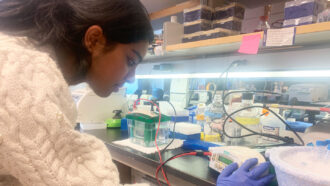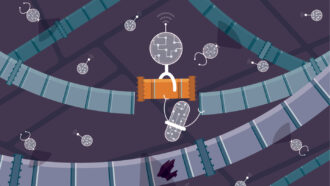Let’s learn about taste
This sense helps us figure out what’s food and what’s poison

Lemons may not taste the best, but they can tell us a lot about what our sense of taste is for — finding out if someone is good to eat.
Zero Creatives/iStock/Getty Images Plus
When naming the five senses, it can be easy to forget taste. After all, sight, sound, touch and smell are happening almost all the time. Taste waits until we put something in our mouths. But taste is extremely important. It helps us determine whether something is good to eat or not. Sweet, salty or the savory taste called umami? That’s probably all right. Bitter or really sour? That might be worth avoiding.
Although taste is a sense we use every time we eat, scientists are still trying to figure out exactly how it works. Chemicals from food hit tiny nubs on our tongue called papillae that hold taste buds. There, the chemicals fit like a key into receptors — molecules that are like locks. When the receptors bind to a taste chemical, they activate the cell to which they are attached, sending a signal onward to the brain.
But scientists are still finding out new things about how taste works. For example, we taste water by sensing sour. Fat might be a taste, all on its own. And while taste is a sense, it’s only one part of what gives something its flavor.

Educators and Parents, Sign Up for The Cheat Sheet
Weekly updates to help you use Science News Explores in the learning environment
Thank you for signing up!
There was a problem signing you up.
Want to know more? We’ve got some stories to get you started:
A taste map in the brain is a scattering of tiny flavor islands: Some senses are highly organized in the brain. Taste is not. And that points to just how important it is. (1/5/2021) Readability: 6.3
Penguins? How tasteless: Penguins may look all dressed up in tuxedo-wear, but their taste buds are the bare minimum. This means that the birds will never sense more than a hint of their meals’ true flavors. (3/3/2015) Readability: 7.6
Can we taste fat? The brain thinks so: Scientists had not considered fat a ‘taste.’ The brain begs to differ, new data show. (7/24/2020) Readability: 6.0
Explore more
Explainer: Taste and flavor are not the same
A cell hookup helps the tongue tell sweet from sour
Taste good? Senses inform the brain — but don’t tell everyone the same thing
The cool science of hot peppers
Touching allows octopuses to pre-taste their food
Taste isn’t all about the tongue. Smell plays an important role, and so does sight! Add some food coloring to juice to find out how color might change what you taste.







